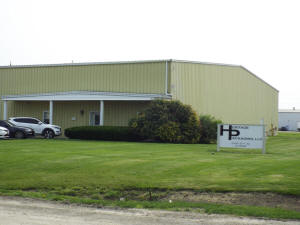Heritage Packaging becomes part of the Welch Packaging
family
 Send a link to a friend
Send a link to a friend
 [June 03, 2019] [June 03, 2019]
On Friday morning, former owner and continuing manager of Heritage
Packaging, Greg Basford announced that he has sold the Lincoln
business. Welch Packaging with owner Scott Welch began operations
effective May 8th of this year.
Heritage Packaging has been in the Lincoln area for several years,
first started by Alan and Nancy Prisk, then sold to the Tapper
family, and finally to Basford in 2007. Basford on Friday said that
the most important part of this story for him personally and for the
community, is that Heritage is stable and will be remaining intact
in Lincoln. There are no plans to move the company or initiate a
significant change in management or staff.

According to Basford, Scott Welch, who purchased his first
corrugated packaging plant in 1985, sought out Heritage because of
its location and its stability in the marketplace. Basford said that
Welch owns a number of businesses related to corrugated packaging
and has a history of maintaining and improving upon what is already
in place. The new mother company is located in Elkhart, Indiana, but
according to their website has plants in Indiana, Ohio and Illinois.
Welch Packaging serves 10 regional locations and have five
distribution centers with more than 1,000 employees overall.
Basford said that talks with Welch began last year in August when
Welch was looking to expand his reach a little further west. His
goal was to capture the markets in the Chicago and St. Louis areas,
and the Lincoln factory was in a great central location. The talks
began as a proposal for Heritage to work for Welch in providing
products into the expanded market area. After spending time
discussing how to do this, Welch made an offer to buy the company.
Basford said that at the time he wasnít looking to sell the company,
and he definitely didnít want to leave the company. Welch however
was a larger business with internal assets that were of great value
to Heritage. For example, the larger company has its own maintenance
people for repairing the specialized manufacturing equipment. It
also has its own technology team, just to name a couple beneficial
differences.
Basford said that he now ďhas peopleĒ he can call when issues arise.
He said for the smaller company this is a huge asset because in the
past, he had to hire outside sources to do the work, or try and
figure it out without the wealth of knowledge and experience
possessed by the Welch teams.
Basford said when the discussions began to get serious, he was
invited to Elkhart, Indiana, to meet with Welchís staff and tour the
plant there. Basford took some of his key personnel with him on that
trip. He said it was really good to see the kind of connection his
staff had with the Welch teams, and he marveled as he saw right away
some of his people asking questions, seeking input on who to do
particular tasks and more. He said it felt right and it felt good.
Basford said that long before the papers were signed, he began
having conversations with his employees. He explained that he had
some stipulations on the sale including that the plant would remain
open and the current employees would be secure.
Basford noted that Welch is not the first opportunity he has had to
sell Heritage. He said that Heritage is a good little plant that has
done very well for itself. The corrugated packaging industry is a
hot commodity right now and is benefitting from the ďAmazon effect,Ē
where that more and more people are buying online instead of going
to the brick and mortar businesses. This is a trend that is still
growing, and the demand for paper products is still increasing.
All this, and its location, Heritage was a desirable acquisition for
other companies as well. But, Basford said he didnít feel that those
companies would purchase Heritage with the best interest of the
employees and the community in mind.
[to top of second column] |


Welch on the other had has a reputation for keeping things intact. Basford said
that they talked about that and Welch noted that he had tried a time or two to
bring new people into new acquisitions and he learned quickly that it just
doesnít work.
On the other hand, there is also room to grow the business even more with the
new owner. Basford said that long term plans will include adding new equipment
that will increase automation and at the same time bring in new jobs.
Heritage Packaging from its first owners to its most recent past owner has been
a labor of love that has taken a lot of time, effort, and more than a few
worries. For Basford, on a personal note, it is the best kind of sale and
takeover because he gets to stay where he loves doing what he loves.
He noted that he hasnít invested this many years of his life into the business
to just let it go. He has no desire to leave, and was happy to find that Welch
has no desire for him to leave.
Basford remembered some of his history, noting that when he came to Lincoln he
was working toward ending a cycle of constant moves and uprooting of his family.
He found stability in this area and was able to raise his family in one location
for the last 12 years. Prior to that he said he was here a year, there a year,
and that his kids were constantly moving from one new school to another. He said
his wife and children supported his dream and were willing to take the risk with
him when he purchased Heritage.

For him, that first year or two were humbling and nerve-racking. He said how
unfortunate was it that one would go into a new business venture and live
through an economic disaster just one year later. Basford recalled that in 2008
it was a struggle to stay positive. The company had good clientele and they
didnít lose any of their customers, but, the customers were feeling the crunch
of an economy when buying stopped because money was tight, and orders decreased
in size. Basford said in those early times, he would drive home every evening
saying a prayer that tomorrow would be better. Eventually it did get better, and
the company survived the storm and came out better than it had been. Since then
Heritage has grown and expanded and worked hard to keep up with the times and
the changing markets.
He cited for example, that the products that leave his plant are 100-percent
recyclable and also made with at least 40-percent recycled materials; very
important in this day and age.
Basford was asked if the change in ownership would take some of the pressure off
of him personally, and allow him to slow down and relax a bit. Basford laughed
and said, ďI donít know how to do this any other way! You canít slow down and
expect to achieve results. The Welch teams provide us with vast amounts of
knowledge in-house that we didnít have in the past. Nothing takes care of itself
and you donít grow by doing nothing. We have a good team here, and it is only
going to get better.Ē
In summary, Basford is very excited about the future of Heritage, and he says
his employees are too. At first there is uncertainty when change is on the
horizon, but having his team know that they still have a future with Heritage is
important to them and himself.
He noted that from the outside looking in, the community will see very little
change. The company will remain Heritage Package, but will add to their name
that they are part of the Welch Packaging Group. Other than that, everything is
going to look the same and be the same, only better.
[Nila Smith] |